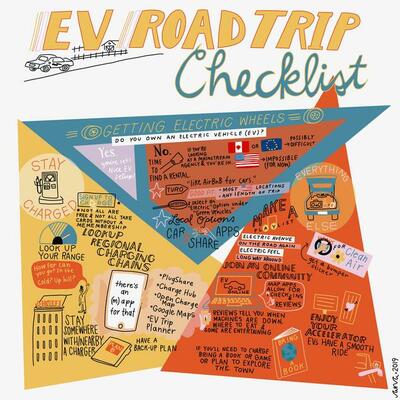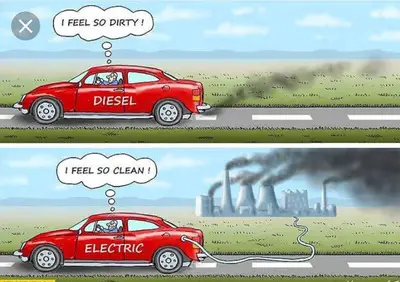EV Charging Scenario Shows Devastating Refueling Issues in USA - Limiting Freedom Of Mobility
SEE ALSO: Biden(et al), Are Championing A Green New Deal "Forever Monopoly", A Permanent Barrier Against Any Future Mobility Innovation +VIDEO
SEE ALSO: The Ugly Truth Emerges - Smart Charging May Be Only Way of Saving Power Grid in World of EVs
SEE ALSO: Report Shows The Auto Channel is Correct About EV Fairy-tale
EV Charging Fun EV Charging Fact: To match the 2,000 cars that a typical filling station can service in 12 hours, an EV charging station requires 600 50-kW chargers at an estimated cost of $24 million and a supply of 30 megawatts of power from the grid For Each Filling Station.
ALEXANDRIA, Va. February 15, 2022; NACS online reported that after the Biden Administration released its $5 billion plan to fund an electric vehicle (EV) charging infrastructure, claims surrounding a hypothetical scenario in which all U.S. gas stations would be replaced with equal capacity EV charging stations spread on social media, reports USA Today.“Fun EV fact: To match the 2,000 cars that a typical filling station can service in 12 hours, an EV charging station requires 600 50-kW chargers at an estimated cost of $24 million and a supply of 30 megawatts of power from the grid. For. Each. Filling. Station. In. America,” one Facebook post read.
This hypothetical scenario has not been proposed by any federal, state or industry leaders, plus the posts bungle the reality of EV charging times and gas station traffic, according to USA Today.
While technically it is possible for a gas station to serve 2,000 cars in 12 hours, each vehicle driver would have to park, pump, pay and leave within 3.6 minutes, according to Jeff Lenard, NACS vice president of strategic initiatives. Lenard estimates that U.S. gas stations actually serve about 150 vehicles every 12 hours.
Also, the post says that it would take 600 50-kW EV chargers 12 hours to charge 2,000 cars, and experts say this is a vast overestimate of EV charging time and capacity.
Ian Miller, a research associate at the MIT Energy Initiative, says that the average electric car battery capacity in the U.S. is roughly 60 kWh, and he estimates that it would take about 72 minutes to fully charge such a car on a 50-kW charger. Even if each vehicle driver received an additional four minutes to pay, park and leave (more time than the gas cars were allotted), it would take less than five hours to charge 2,000 EVs, reports USA Today.
What’s more, even if the vehicle fleet turned over to EVs tomorrow, it will take decades before all vehicles on the road are electric. Conventional internal combustion engine vehicles will still be the norm, and gas stations will serve them.
According to Jessika Trancik, a professor at the Massachusetts Institute of Technology, EV charging infrastructure doesn’t need to mirror the liquid fueling industry because most EV owners charge their cars at home.
“Charging at home or work will represent the majority of electric vehicle charging,” Michael Berube, a deputy assistant secretary at the Department of Energy, told USA TODAY.
This type of charging uses slower, level 2 chargers, running at 3.3-6.6 kW and cost an average of $1,400 to install at home, according to the Department of Transportation website.
“If you magically replaced all gas cars with EVs tomorrow, you would need fewer refueling stations, because no one has a gas station in their home, but roughly half of U.S. car owners do have an electricity station” if they install a charger, Miller told USA TODAY.
Gas stations aren’t the only places to install these slower EV chargers. They can also be placed on streets near homes, in parking facilities, workplaces and hotels.
Faster, 50-kW chargers reportedly make more sense near interstates, highways and in rural areas, where people are driving long distances, and in cases where EV owners don’t have access to home or work chargers. This is where gas stations would come in, and EV owners could quickly “fill up” there once a week or so.
A recent Convenience Matters podcast episode discusses how EVs are the future, and another episode explains how convenience retailers can attract and retain EV customers.
Visit the NACS Electric Vehicles topics page for more information about EVs. The NACS EV Charging Calculator was created to allow retailers to assess the cost and profitability of offering EV chargers at their sites. The calculator focuses on what retailer utility costs associated with EV recharging are and what the corresponding revenue must be to recover those costs after allowing for potential ancillary in-store visits and purchase profitability.
Read more about electricity demand charges and what they mean for retailers’ ability to turn a profit from EV charging in the September issue of NACS Magazine.
White House Releases $5 Billion Plan for EV Charging Infrastructure
ALEXANDRIA, Va.—The Biden Administration has released its plan to fund electric vehicle charging infrastructure, focusing on interstate highways first, and then rural areas at a later date, reports the Wall Street Journal.
The administration said the goal of the plan is to give Americans the ability to access public EV charging as easily as it is to find a gas station.
The administration will award nearly $5 billion over five years to states so they can build EV chargers along highway corridors. The money was part of the bipartisan infrastructure bill that was passed last November and will be distributed among all 50 states plus Washington, D.C., and Puerto Rico, with the biggest allocations to California, Florida and Texas.
The plan says that states must install an EV charger every 50 miles and must be located no more than one mile off of high-use corridors, mostly interstates. The chargers must have at least 600 kilowatts of total capacity, with ports for at least four cars that can simultaneously deliver at least 150 kilowatts each, says the Journal. The chargers also need to be accessible to the general public or to fleet operators from more than one company.
States need to submit their plans on how they will use the funding and how they will install the chargers by August, and federal officials will approve or deny states’ plans by the end of September, reports the New York Times.
“We're not going to dictate to the states how to do this, but we do need to make sure that there are meet basic standards,” U.S. Transportation Secretary Pete Buttigieg said at a press conference.
The infrastructure bill included $7.5 billion for EV charging buildout, and the remaining $2.5 billion will be used to install chargers in rural areas with little access to charging, with those plans being released later this year.
The administration expects states to contract with private companies to purchase and install the chargers, as well as operate the stations, and the federal money can support only 80% of the cost of these stations.
Earlier this week, President Biden touted an Australian EV charger company for agreeing to build a manufacturing facility in Tennessee, saying the plant will "have a ripple effect" far beyond the state. The White House and the company, Tritium, says that the new plant will produce up to 30,000 electric vehicle chargers per year.
Shortly after inauguration, President Biden announced his goal to have half of all new cars sold in the U.S. be electric or hybrid vehicles.
Read more about electricity demand charges and what they mean for retailers’ ability to turn a profit from EV charging in the September 2021 issue of NACS Magazine.
The NACS EV Charging Calculator was created to allow retailers to assess the cost and profitability of offering EV chargers at their sites. The calculator focuses on what retailer utility costs associated with EV recharging are and what the corresponding revenue must be to recover those costs after allowing for potential ancillary in-store visits and purchase profitability.
A recent Convenience Matters podcast episode discusses how EVs are the future, and another episode explains how convenience retailers can attract and retain EV customers.
At the 2021 NACS Show, three education sessions focused on the opportunity that EVs bring to retailers. Receive six-month access to this primer on electric vehicles for $49.
To learn more about the Biden Administration's previous steps and actions to advance EV infrastructure and adoption, read "Energy Moves" in Fuels Market News Magazine's Fall 2021 Issue.




